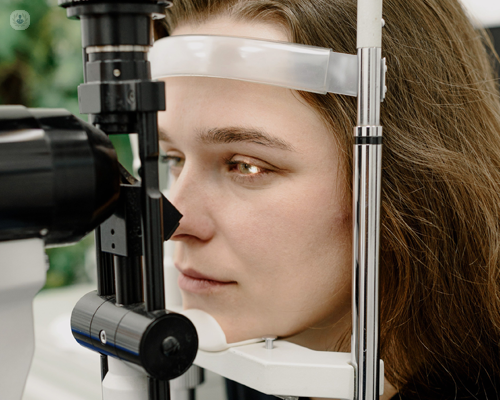Diabetic retinopathy: what you should know about diabetic retinopathy
Written by:Diabetic eye diseases are a group of conditions that can affect the quality of vision for patients with diabetes. Esteemed London-based ophthalmologist, Professor Adnan Tufail explains in detail how diabetes can affect vision. He reveals the importance of recognising the symptoms of diabetic retinopathy early to prevent complete loss of vision and discusses how to manage the condition with the help of medical advancements over the past few decades.

What is diabetic retinopathy?
Diabetic retinopathy is a disorder that affects patients who have diabetes. Over time, diabetes damages the little blood vessels that look after the light-sensitive layer at the back of the eye called the retina. The damage to these blood vessels can either make them shut down or make the blood vessel wall leaky, and either way that can affect vision. If we pick up these changes promptly, we can treat them and prevent visual loss.
What are the stages of diabetic retinopathy?
In most cases, before patients develop visual loss, we can notice changes in the retina before a visual loss occurs. These could be changes in the calibre of the large blood vessels, haemorrhages, or little dilated capillaries. In most, but not all patients, this is a slow progressive change and by looking at the back of the eye either with a digital camera or by clinical examination we can pick up these changes and treat them appropriately to prevent visual loss.
When we look at the eye, we can grade the severity of retinopathy. This will help us determine how frequently we should see you. It also helps us interact with your diabetologist or your GP, to improve diabetic control which will also prevent the progression of retinopathy.
Can it lead to blindness?
Untreated diabetic retinopathy, in the minority of diabetics, can cause severe visual loss. However, since the advent of effective treatments over 30 years ago it is unusual now to be blind from diabetes with regular screening and prompt treatment. This treatment initially was done with laser, and more recently supplemented with various medicines we put in the eye that can limit blood vessel growth called anti-VEGF injections. Diagnosing the disease before a visual loss occurs can prevent blindness. That’s why it’s important to see a retina specialist regularly if one has diabetes.
Is there a cure for diabetic retinopathy?
Unfortunately, once you're diabetic, it can’t be cured completely. It can, however, be controlled. No matter how well you control your diabetes, there is always the risk of progression, but the better you control your blood pressure and renal function, the lower the risk is. If your diabetes is reversed, meaning you have your Type 2 Diabetes under complete control and you become normal glycaemic, or if you’re Type 1 and you’ve had a transplant, progression will be limited after that.
What are the available treatment options?
Our approach to treatment depends on how diabetes affects your eyes; it will cause what's called diabetic retinopathy, diabetic maculopathy, and earlier onset cataracts. In the case of diabetic retinopathy, diabetes damages blood vessels in the peripheral retina reducing the blood supply and oxygen to the eye over time and causing the growth of abnormal blood vessels into the cavity of the eye, which can leak and bleed. Prompt treatment with laser and/or injections of a drug that stops blood vessels leaking, called anti-VEGF, can massively reduce the risk of visual impairment. For diabetic maculopathy, the mainstay of treatment is the anti-VEGF injections, but occasionally laser or corticosteroid implants are used. Lastly, diabetics are more prone to earlier cataracts and although standard cataract operations are highly successful, it's very important in diabetics that your maculopathy and retinopathy are appropriately controlled before cataract surgery, as these may rapidly worsen if uncontrolled before cataract surgery.
If you fear that you may be experiencing diabetic retinopathy, or to discuss any other eye issues you are having, you can book a consultation by visiting Professor Adnan Tufail directly from his Top Doctors profile.


